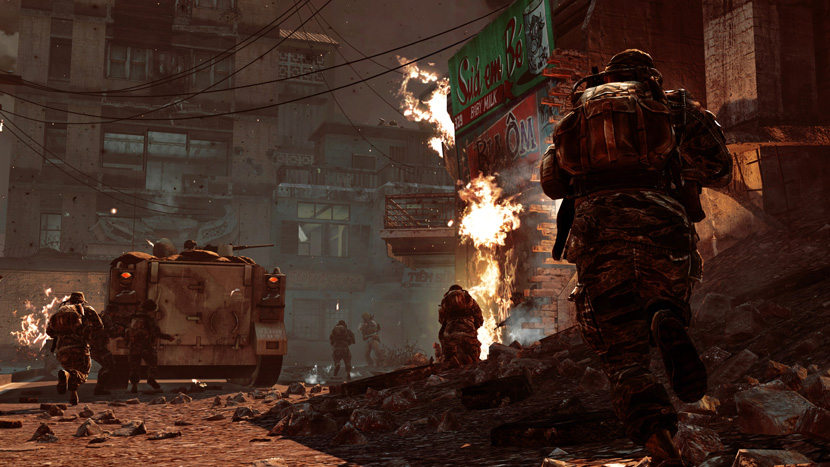Video Games May Shield Soldiers During Nightmares

Get the world’s most fascinating discoveries delivered straight to your inbox.
You are now subscribed
Your newsletter sign-up was successful
Want to add more newsletters?

Delivered Daily
Daily Newsletter
Sign up for the latest discoveries, groundbreaking research and fascinating breakthroughs that impact you and the wider world direct to your inbox.

Once a week
Life's Little Mysteries
Feed your curiosity with an exclusive mystery every week, solved with science and delivered direct to your inbox before it's seen anywhere else.

Once a week
How It Works
Sign up to our free science & technology newsletter for your weekly fix of fascinating articles, quick quizzes, amazing images, and more

Delivered daily
Space.com Newsletter
Breaking space news, the latest updates on rocket launches, skywatching events and more!

Once a month
Watch This Space
Sign up to our monthly entertainment newsletter to keep up with all our coverage of the latest sci-fi and space movies, tv shows, games and books.

Once a week
Night Sky This Week
Discover this week's must-see night sky events, moon phases, and stunning astrophotos. Sign up for our skywatching newsletter and explore the universe with us!
Join the club
Get full access to premium articles, exclusive features and a growing list of member rewards.
The soldier frantically searched a forest for his rifle as an unknown threat hunted him. When he finally found the weapon and turned to shoot, the trigger felt like it had a 1,000-pound pull and his bullets failed to hit the target. It was a classic nightmare scenario.
But combat dreams don't always go that way. Soldiers who spend long hours playing "hardcore" games such as "Call of Duty: Modern Warfare 2" and "Battlefield: Bad Company 2" seem better able to take control and fight back against aggressive threats and violence in their dreams, according to a preliminary online survey. By contrast, soldiers who did not play video games much suffered from more emotional distress and a frozen sense of helplessness in their dreams.
Past research suggests that frequent video game players, known as gamers, may possess greater awareness and control in dreams, and so researchers have theorized that games might act as a virtual reality rehearsal for the threat simulations found in nightmares. The recent study looked at 98 mentally healthy soldiers and classified them into high gaming and low gaming groups to examine the differences in their dreams.
"Within this high-functioning group, [gaming] is clearly adaptive," said Jayne Gackenbach, a psychologist at Grant MacEwan University in Canada. For the study, she worked with a colleague and students at Athabasca University in Canada.
The high gaming group played military-themed shooter games such as “Call of Duty” and “America's Army,” as well as strategy simulations and massively multiplayer online games such as "World of Warcraft." The low gaming group favored casual games such as the puzzle game "Bejeweled," and did not play daily or weekly like the heavy gamers did.
Both groups saw about the same levels of deployment and combat in real life, and experienced about the same level of aggression and threat in their dreams. The big difference was how the soldiers reacted to dream threats.
"The low-end gamers were sadder, angrier and more fearful [in real life]," Gackenbach told InnovationNewsDaily. "That's concerning, but again I controlled for that because it was the gaming I was interested in."
Get the world’s most fascinating discoveries delivered straight to your inbox.
Gackenbach's group coded the dream elements based on a system created by a researcher who had studied nightmares among Vietnam War veterans.
The survey excluded anyone who was suicidal, had addictions or reported symptoms of mental disorders such as post-traumatic stress disorder (PTSD). Still, Gackenbach hopes to someday study the effects of gaming in that population as well, given that nightmares are a classic symptom of PTSD.
Of course, the findings could use more validation from bigger surveys even if all the evidence is "lining up pretty nicely," Gackenbach said. She presented the survey results at the Game Developers Conference held in San Francisco from Feb. 28 to Mar. 4.
But the U.S. military already seems intrigued by the idea of gamelike simulations having somewhat of a protective effect against combat traumas. It has funded work by Albert "Skip" Rizzo, a University of Southern California psychologist, to help create a virtual simulation that could help new recruits mentally prepare for the potential stresses of war.
This story was provided by InnovationNewsDaily, a sister site to LiveScience.
 Live Science Plus
Live Science Plus











